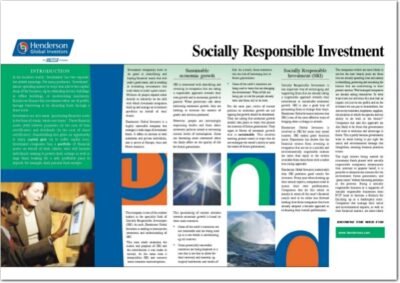
In the business world, ‘investment’ has two separate but related meanings. For many producers, ‘investment’ means spending money in ways that add to the capital stock of the business, e.g. by extending factory buildings or office buildings, or modernising machinery. Businesses finance this investment either out of profits, through borrowing or by attracting funds through a share issue.
Financial assets
Investment can also mean ‘purchasing financial assets in the form of stocks, bonds and shares’. These financial assets yield interest payments (in the case of loan certificates) and dividends (in the case of share certificates). Shareholding also gives an opportunity to enjoy capital gain (or to suffer capital loss).
Investment companies buy a portfolio of financial assets on behalf of their clients, who will include individuals seeking to protect their savings as well as large firms looking for a safe, profitable place to deposit, for example, their pension fund receipts. Investment companies have to be good at identifying and buying financial assets that will yield a good return and at avoiding or discarding investments that look likely to yield a poor return. Millions of people depend either directly or indirectly on the skill with which investment companies build up and manage an investment portfolio on behalf of their clients.
Henderson Global Investors is a highly successful company that manages a wide range of investment funds. It offers its services to both institutions and private individuals and is active in Europe, Asia and North America. The company is one of the market leaders in the specialist field of Socially Responsible Investment (SRI). As such, Henderson Global Investors is seeking to increase the awareness and understanding of SRI.
This case study examines the nature and purpose of SRI and the contribution it can make to society. At the same time it demystifies SRI and corrects some common misconceptions.
Sustainable economic growth

SRI is concerned with identifying and investing in companies that are taking a responsible approach towards their own growth and to economic growth in general. When politicians talk about delivering economic growth, they are looking to increase the amount of goods and services produced.
However, people are increasingly expressing doubts and fears about economic policies aimed at increasing current levels of consumption. Some are becoming more concerned about the likely effect on the quality of life for future generations. This questioning of current attitudes towards economic growth is based on three main concerns:
- Some of the earth’s resources are not renewable and are being used up at a rate which is accelerating, e.g. oil reserves.
- Some potentially renewable resources are being depleted at a rate that is too fast to allow for their recovery and renewal, e.g. tropical hardwoods and stocks of fish. As a result, these resources run the risk of becoming lost to future generations.
- Some of the earth’s resources are being used in ways that are damaging the environment.
Ways of life are being put at risk for people already born and those still to be born. For the most part, critics of current policies on economic growth are not arguing that growth should be abandoned. They are saying that economic growth should take place in ways that protect the interests of future generations. They argue in favour of economic growth that is sustainable. This involves meeting present needs in ways that do not endanger the world’s ability to meet the needs of future generations.
Socially Responsible Investment (SRI)

Socially Responsible Investment is one important way of encouraging and supporting firms that are already taking a responsible approach towards their contribution to sustainable economic growth. SRI is also a good way of persuading firms to change their ways. Henderson Global Investors believes that SRI is one of the most effective ways of bringing about a change in attitude.
Henderson Global Investors is involved in SRI for some very sound reasons. SRI makes good business sense. Experience has shown that the financial returns from investing in companies that are run in a socially and environmentally responsible manner are more than equal to the returns available from those firms with a rather less caring approach.
Henderson Global Investors understands why SRI produces good results for investors. Every year when drawing up their annual reports, companies need to assess their own performance. Companies that do this solely or mainly in terms of this year’s financial results tend to be rather less forward looking than those companies that have already adopted a broader approach to evaluating their overall performance.
The companies which are most likely to survive the next twenty years are those that are already spending time and money in identifying, protecting and sustaining the factors that are contributing to their present success. Well managed companies are already asking themselves ‘In what ways have our activities this year had an impact, not just on our profits and on the dividend we can pay to shareholders, but also on our customers, employees, suppliers, the localities in which we operate and our ability to do well in the future?’
Companies that take this approach are also likely to be those that governments will want to welcome and encourage in future. This is partly because governments want to avoid having to put right the social and environmental damage that thoughtless, uncaring business practices create.
Concern for the environment
The high returns being earned by investment funds placed with socially responsible companies demonstrate that, contrary to popular belief, it is possible to demonstrate concern for the environment, future generations, and ‘green issues’ without becoming penniless in the process. Being a socially responsible business or a supporter of socially responsible businesses does NOT need to become a formula for finishing up in a bankruptcy court. Companies that manage their social and environmental impacts, as well as their financial matters, are more likely to be able to operate their business more efficiently and effectively.
In operating its SRI portfolio, Henderson Global Investors applies a set of criteria. It looks for companies that:
- Are in sectors of the economy benefiting from, contributing to, or best adapting to the need to provide the world with sustainable economic development, e.g. health care provision, education provision, mass transport, renewable energy, water management; i.e. industries of the future
- Show up well when assessed against conventional measures of financial performance, e.g. return on capital employed, profits as a percentage of turnover, labour productivity
- Exhibit ‘best practice’ within the sectors in which they operate; e.g. are taking into account the social and environmental impact of their operations when evaluating their own performance, i.e. best in class
- Show a willingness to engage in a dialogue with institutional investors, and particularly with Henderson Global Investors’ expert researchers in sustainable economic development
- Recognise and accept that a company’s investors have a legitimate interest in how it operates, e.g. in the steps the company takes to safeguard human rights both for its own employees and also for people employed by its suppliers.
The contribution of SRI to promoting sustainable growth
Henderson Global Investors believes that it is in a good position to influence how companies conduct their business. This is because:
- Companies need sources of investment funds in order to survive
- Companies need a healthy share price to attract further investment funds. If institutional investors stop holding a particular company’s shares, that company’s stock market valuation is likely to slump
- Leading companies know that Henderson Global Investors does not practise ‘naming and shaming’ but will invest in the best and encourage the rest
- Henderson Global Investors believes that working from within the system and also discreetly ‘behind the scenes’ is the most effective way of bringing about change. Such an approach may not be headline grabbing, but it is highly pragmatic and recognises business realities. Some companies that still have to be ‘won over’ have annual budgets greater than some countries’ total annual output and feel that they do not, as yet, have to concern themselves with the prospect of being brought down by international law, governments or street demonstrations
- Henderson Global Investors, with its worldwide connections, knows some of the best ways to influence how companies conduct their business. It has experience, for example, of joint initiatives with pressure groups such as Greenpeace. One initiative involved buying shares in a leading company and then using a shareholder’s right to table a resolution at the company’s Annual General Meeting to improve that company’s environmental performance
- Companies are becoming keen to see their shares being held within SRI portfolios. It is rather like receiving a seal of approval.
As SRI becomes even better known, the importance to companies of achieving acceptability with SRI fund managers is likely to increase.
Working together

The media tends to portray the process of persuading firms to adopt responsible business practices as wholly confrontational: banners on factory chimneys and gallant little ships crossing the bows of industrial giants. Such stories bring issues to public attention, but they give a misleading impression of the major forces that are driving firms to change the way they operate.
People who believe in SRI as a way of influencing the behaviour of firms see last ditch measures as a clear sign that SRI has not yet penetrated far enough into business culture. Properly presented, SRI can appeal to enlightened self interest. Firms have a great interest in self preservation; they want to be around in 100 years from now and to be respected household names. Within an SRI approach, skilled professionals are able to demonstrate to companies that:
- By taking care of the environment in which they operate, and by being socially responsible, companies are increasing their own chances of survival
- By failing to look beyond their own short term requirements, businesses are putting their own futures at risk
- Projects that involve spending money more responsibly may seem expensive in the short term but can yield huge long term benefits, e.g. improving the education, housing and healthcare of employees in developing countries, can improve productivity and increase staff loyalty.
Conclusion

When a business adopts a broader view of its economic, social and environmental responsibilities it is serving the interests not only of society as a whole but of itself as well.
Henderson Global Investors is succeeding in putting this message across to the companies with which it deals when building up its SRI portfolio. It is also being increasingly successful in convincing its own clients that investments placed within an SRI portfolio not only support a cause in which the clients believe but also offer prospects of a very good financial return.
 Socially responsible investment (PDF)
Socially responsible investment (PDF) 